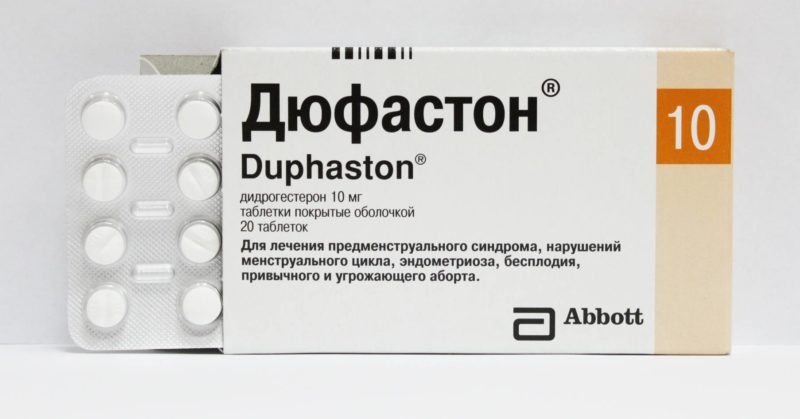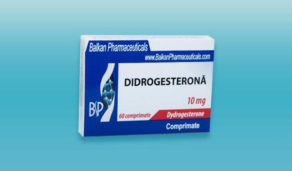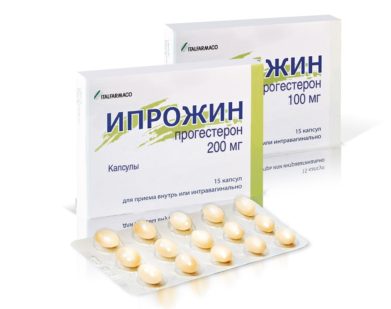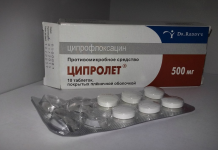The drug Dufaston, the side effects of which will be discussed later, normalizes the hormonal background of the female body. The drug is successfully used at the planning stage of pregnancy and in the process of bearing a child.
Material Content:
The composition of the drug
The active component that is contained in the medicine is didrogesterone. In a tablet - 10 mg of the active substance. This is an analogue of progesterone - the hormone responsible for the onset and course of pregnancy, for women's health.
Additionally, the pharmaceutical agent contains:
- corn starch;
- magnesium stearate;
- lactose monohydrate;
- silica.
Side effects and contraindications Duphaston
Studies suggest that a synthetic drug does not contribute to rapid weight gain. But during therapy using Duphaston, the manifestation of other adverse reactions is not ruled out, for example:
- hemolytic anemia;
- dizziness
- discomfort in the area of the mammary glands;
- nausea
- allergic rashes (in rare cases, there is Quincke's edema);
- abdominal pain;
- violations of the liver;
- uterine bleeding;
- drowsiness
- intestinal malfunctions.
Tablets should not be taken in the following cases: with intolerance to the constituent components and with lactase deficiency, glucose and galactose intolerance, malabsorption syndrome.
Undesirable effects also arise as a result of an overdose, so it is important to follow the recommendations of a specialist.
Duphaston is contraindicated in women who breast-feed a baby.
Reception during planning and early pregnancy
When planning a conception, Duphaston is drunk with courses - 1 tablet from the 13th to the 25th day of the cycle.
At the initial stage of pregnancy, a specialist can prescribe a drug if there are certain risks when carrying a child. This usually affects those patients who previously had abortions, miscarriages, diseases of the female genital organs.
Another reason for the appointment of the drug is an increased tone of the uterus. Duration and timing of admission in such cases: from the 2nd to the 16th week of pregnancy.
Hormone pills are suitable for those patients who are preparing for IVF. Dufaston begins to drink 20 days before the procedure and continues to take the medicine after the embryo transplant - for 22 weeks.
Instructions for use of the drug
Duphaston 10 mg tablets begin to be used only after consulting a specialist. The doctor will determine the dosage, duration of treatment individually: they will depend on the diagnosis and on the general condition of the female body.
The medicine is prescribed for:
- endometriosis - 1 tablet twice or thrice a day is taken continuously for six months or they take medicine from the 5th to the 25th day of the cycle;
- infertility caused by luteal insufficiency - 1 tablet twice (from the 11th to the 25th day of the cycle, duration - 6 months);
- prolonged absence of menstruation or painful discharge - a tablet twice a day;
- habitual abortion - on a tablet twice a day (from 11th to 25th), begin therapy before conception; when pregnancy occurs, the medicine is taken continuously, up to the 20th week;
- PMS - a tablet twice a day (from the 11th to the 25th day);
- dysfunctional uterine bleeding - 1 tablet twice a day (time period: from the 11th to the 25th day);
- hormone replacement therapy - 1 tablet per day;
- threatening abortion - first 4 tablets at a time, then - 1 pc. every 8 hours, until the symptoms are relieved.
Drug interaction
The effect of Duphaston will be less effective if taken simultaneously with Phenobarbital, Rifampicin. Increased attention will require the parallel administration of progesterone with drugs containing estrogen.
Interaction with other drugs is not described in the instructions.
Analogs
The following pharmaceuticals containing hormones have a similar effect on a woman's body:
- Utrozhestan;
- Dydrogesterone;
- Iprozhin.
Utrozhestan capsules contain progesterone of natural origin.
Indications for oral administration are:
- mastopathy (fibrocystic);
- hormone replacement therapy;
- infertility due to luteal insufficiency;
- threatening abortion;
- irregular menstrual bleeding;
- preventing habitual abortion caused by insufficient progesterone;
- premenopause;
- PMS.
Admission is contraindicated in the presence of patients:
- thrombophlebitis, vein thrombosis;
- bleeding of unknown nature;
- porphyrin disease;
- incomplete abortion;
- malignant tumors of the genital organs, mammary glands;
- serious abnormalities in the liver.
Do not use capsules during lactation, with intolerance to constituent substances. Also, tablets are not prescribed for patients who are under 18 years old.
The dosage of the drug is prescribed depending on the diagnosis.
Indications for taking Dydrogesterone, contraindications and side effects are the same as those of Dufaston.
The specialist selects the dosage individually, given the nature of the disease.
The active component of Iprozhin in capsules is micronized progesterone. The medicine is prescribed in the same cases as Dufaston, Utrozhestan. Contraindications to taking Iprozhin are almost the same as in Utrozhestan.
Patients drink capsules with caution if they have been diagnosed with the following diseases:
- epilepsy;
- heart and vascular disease;
- diabetes;
- depressive state;
- migraine;
- renal failure (chronic form);
- arterial hypertension;
- hyperlipoproteinemia;
- bronchial asthma.
Side effects are manifested in the form of:
- intermenstrual bleeding;
- allergic rashes;
- drowsiness
- reduction in the duration of the menstrual cycle;
- periodic dizziness after each dose.
The doctor determines the dosage of Iprozhin individually.
Side effects of Duphaston during pregnancy are not very common: as a rule, patients tolerate hormone therapy well. In some cases, the doctor will help you choose the appropriate analogue of the drug.




















